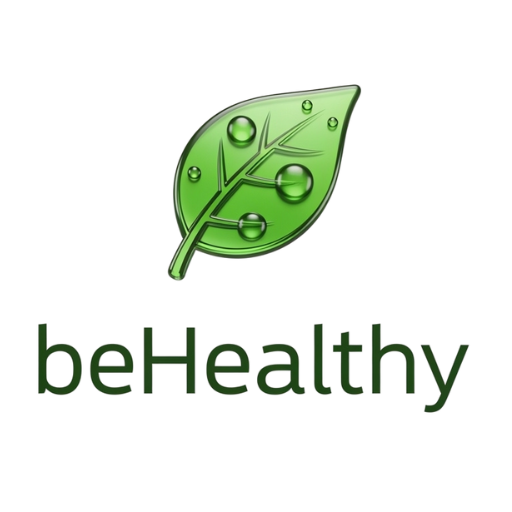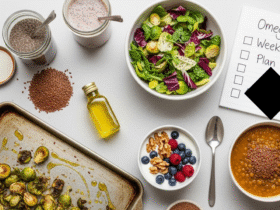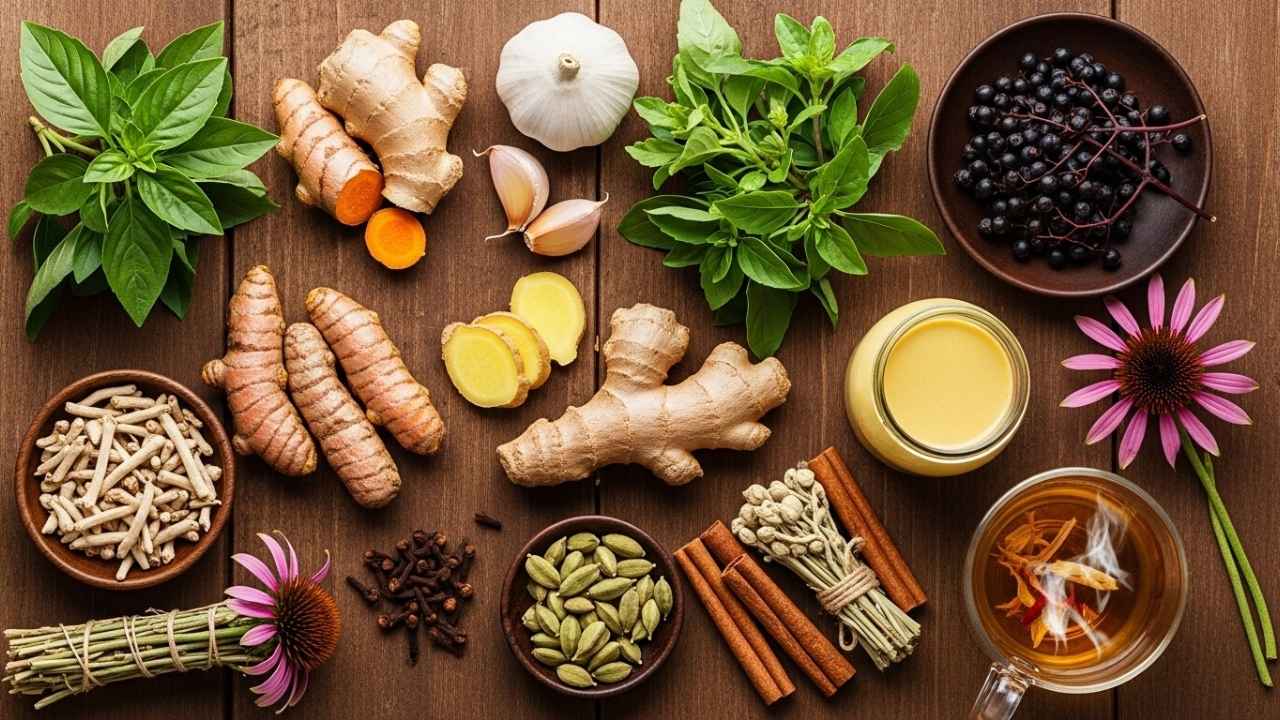In today’s busy world, filled with fast food, stress, and a lack of sleep, it’s no surprise that we are all on the lookout for natural ways to strengthen our immune system. While vitamin supplements have their time and place, there’s something even more powerful that you likely already have sitting on your kitchen rack: herbs and spices.
Throughout history, people across the globe have relied on plants, not only for flavoring but also as remedies. In recent years, modern science has started to catch up, confirming what ancient healers and grandmothers have always known: some herbs and spices can help boost our body’s natural defenses. Whether it’s inflammation-busting turmeric or germ-fighting garlic, the answer to a stronger immune system could be found in your next meal.
In this two-part guide, we’ll explore some of the most beneficial herbs and spices for immune support, and how you can easily incorporate them into your daily routine. Whether you’re looking to stay healthy during flu season or just need more energy and balance, let’s dive into the plant-powered world of immune boosters.
Why Support Your Immune System Every Day? (Not Just in Winter)
Think of your immune system as an army of defenders protecting your body. Even the most battle-hardened soldiers need rest, energy, and strategy to function at their best. In today’s world, however, stress, processed foods, poor sleep, and environmental toxins can overwhelm the immune system, causing it to slow down or divert its efforts away from where it’s needed most.
But here’s the good news: you don’t have to wait until you’re sick to boost your immunity. In fact, the best time to support your immune system is when you’re feeling healthy.
Herbs and spices can help do just that.
Unlike quick-fix remedies you turn to when you’re already sick, many herbs provide subtle, long-term immune support. They don’t just make your immune system stronger, but they also ensure it stays balanced—neither too weak nor overactive. Think of herbs as your allies, quietly strengthening your defenses every day without overwhelming your system.
What Makes Herbs and Spices Great for Immunity?
While most people associate herbs and spices with flavor, these plants are doing much more behind the scenes. They’re packed with powerful properties that directly support your immune system:
- Antioxidants: These compounds protect the immune system by combating free radicals that can damage cells and weaken immunity.
- Anti-inflammatory Properties: Chronic low-grade inflammation can tire out the immune system. Many herbs help reduce inflammation, keeping your immune system sharp and focused.
- Antimicrobial Compounds: Some herbs, like garlic, are natural microbe fighters. They help destroy bacteria, viruses, and other pathogens.
- Adaptogens: Adaptogenic herbs help regulate stress hormones, which can impact immune health if left unchecked.
- Gut Health: A healthy gut is crucial for a strong immune system, and certain herbs help promote digestive health, further supporting immune function.
In short, herbs and spices are not just flavoring agents—they’re functional, packed with properties that work to enhance your immune system every day.
7 Powerful Herbs to Support Immunity (And How They Work)
The following herbs are some of the most effective in stimulating your immune system. These are not exotic or hard-to-find foods—many of them are likely already in your kitchen or can be easily accessed at a health shop or online.
1. Turmeric
Turmeric, often referred to as the “golden root,” has long been celebrated in Ayurvedic medicine. The active compound, curcumin, helps boost immune cell activity and reduces inflammation and oxidative damage throughout the body, making it a powerful anti-inflammatory and antioxidant.
Use Instructions:
- To enhance absorption, add a teaspoon of turmeric to soups, curries, or golden milk along with black pepper.
2. Ginger
Ginger is spicy, warming, and soothing. It is known for its ability to aid digestion, act as a nasal decongestant, and reduce inflammation. The compounds gingerols and shogaols in ginger work together to fight microbial threats and support the immune system.
Use:
- Make fresh ginger tea.
- Add ginger to stir-fries and smoothies for a daily immune boost.
3. Echinacea
Echinacea is widely regarded as a remedy for colds. It works by stimulating the production of white blood cells, helping the body fight infections more effectively. Echinacea can also shorten the duration of cold symptoms when taken early.
Use:
- Use echinacea tincture or capsules at the first sign of illness for maximum benefit.
4. Elderberry
Elderberries are packed with antioxidants and antiviral properties, making them beneficial for supporting the respiratory system. Research shows that elderberry extract may help reduce the severity and duration of flu symptoms.
Use:
- Drink elderberry syrup or take elderberry gummies when experiencing cold or flu symptoms.
5. Ashwagandha
Chronic stress is a major immune system suppressant, and ashwagandha—an adaptogen—can help your body manage stress. It supports adrenal health and helps balance immune function.
Use:
- Take powdered ashwagandha root with warm milk, or opt for ashwagandha capsules daily for stress relief and immune support.
6. Holy Basil (Tulsi)
Holy basil, or Tulsi, is another adaptogen that not only supports the respiratory system but also reduces stress and acts as an antibacterial herb. It’s often used to promote overall wellness and resilience.
Use:
- Steep dried tulsi leaves in hot water to make a healing tea.
7. Astragalus
Astragalus is a powerhouse herb in Traditional Chinese Medicine, known for its ability to boost the immune system and protect the body from seasonal illnesses. It helps improve immune function and overall vitality.
Use:
Add astragalus root slices to soup broths, or take it in capsule form as part of your daily routine.
Top Immunity-Boosting Herbs Compared
| Herb | Main Benefit | Best Form | Caution/Note |
|---|---|---|---|
| Turmeric | Anti-inflammatory, antioxidant | Powder, capsule | Needs black pepper for absorption |
| Ginger | Antiviral, digestion, circulation | Fresh root, tea | May thin blood if taken in high doses |
| Echinacea | Cold/flu prevention and immune stimulant | Tincture, capsule | Avoid daily long-term use |
| Elderberry | Respiratory virus protection | Syrup, gummies | Raw berries are toxic – only use prepared |
| Ashwagandha | Adaptogen, reduces stress | Powder, capsule | May lower blood pressure |
| Holy Basil | Adaptogen, antibacterial | Tea | May stimulate uterine contractions (avoid in pregnancy) |
| Astragalus | Immune enhancer, energy support | Dried root, capsule | Avoid during active fever |
6 Everyday Spices That Help Strengthen Immunity

You don’t need to visit an apothecary for immune support—just open your spice rack! These common spices, not only delicious in taste, have been used for centuries. Thanks to modern research, we now know these everyday foods contain powerful immune-enhancing qualities.
1. Garlic
Raw garlic contains allicin, a potent antimicrobial and antiviral agent. It’s also beneficial for gut health, which is the first line of defense in immunity.
Application:
- Crush garlic and allow it to rest for 10 minutes before consuming it raw in dressings.
- Lightly sauté it in dishes for added flavor and immune benefits.
2. Black Pepper
Black pepper is more than just a seasoning. Its active compound, piperine, enhances nutrient absorption, especially of turmeric. It’s also packed with antioxidants and anti-inflammatory properties.
Use:
- Combine black pepper with turmeric in food.
- Sprinkle it over soups and salads for an added immune boost.
3. Cinnamon
This warm spice helps maintain blood sugar levels, indirectly boosting the immune system. Cinnamaldehyde, the active compound in cinnamon, also has antimicrobial effects.
Use:
- Add cinnamon to your oats, tea, or almond butter for a healthful, immune-boosting addition.
4. Clove
Clove contains eugenol, a natural antiseptic. Studies have shown that it has antimicrobial properties and supports immune function.
Use:
- Place whole cloves in tea or mix them with aromatic spices for a fragrant immune-boosting blend.
5. Cardamom
Cardamom supports digestion and detoxification, helping the body break down toxins and preventing inflammatory responses.
Use:
- Add cardamom to tea, smoothies, or cooked rice for both aromatic flavor and health benefits.
6. Cayenne Pepper
This hot spice contains capsaicin, which helps boost circulation, detoxify the body, and activate the immune system.
Use:
- Add cayenne pepper to lemon water, sauces, or savory meals if you enjoy a spicy kick.
Getting Started with Immunity-Boosting Herbs and Spices
Entering the world of herbs and spices doesn’t have to be overwhelming. You don’t need to buy every herb under the sun or expensive supplements. The key is to keep it simple and consistent. Here’s how you can incorporate these immune-boosting herbs and spices into your daily routine:
- Morning: Drink turmeric-ginger tea to start your day with a powerful boost.
- Lunch: Enjoy a lentil soup packed with garlic for a savory immune-boosting meal.
- Post-Smoothie: Sprinkle cinnamon and clove after your smoothie for added benefits.
- Evening: Sip holy basil tea before bed for relaxation and immune support.
Remember, the goal is not to consume all of them at once, but to incorporate them into your routine for lasting immune support.
The Safest Way to Combine Herbs and Spices for Optimum Benefits
When combining herbs and spices, keep in mind that more is not always better. Here are some smart ways to use them effectively:
1. Do Not Overload Your System
Start with just 2-3 herbs or spices. Your immune system needs time to adjust. For example:
- Drink ginger and turmeric tea once a day for a week, then follow with elderberry syrup for the next week.
2. Pair for Synergy
Some herbs and spices complement each other, creating powerful combinations. For example:
- Turmeric + Black Pepper: This pairing increases the absorption of curcumin by up to 2000%.
- Ginger + Cinnamon: Great for enhancing circulation.
- Holy Basil + Ashwagandha: A stress-reducing and immune-boosting powerhouse combo.
3. Pay Attention to Timing
Some herbs work better at specific times of the day:
- Energizing herbs like ashwagandha or turmeric are great in the morning.
- Herbs like tulsi or elderberry work well in the evening or when you’re feeling under the weather.
4. Consider the Form
Herbs can come in many forms, and the best form depends on your lifestyle and needs:
- Teas are ideal for mild immune support.
- Tinctures provide concentrated effects for quicker results.
- Capsules and powders are easy to use and can be added to meals.
Choose the form that best fits your routine and preferences.
Two DIY Immunity Recipes You Can Make at Home
Now that we know how powerful herbs and spices are for boosting the immune system, let’s put this knowledge into practice with two simple and quick recipes that take less than 10 minutes to prepare.
🌿 Recipe 1: Golden Immunity Milk
A warm, soothing drink packed with immune-boosting spices—perfect for an afternoon snack or a bedtime drink.
Ingredients:
- 1/2 teaspoon turmeric powder
- 1 pinch black pepper
- 1/4 teaspoon cinnamon
- 1/4 teaspoon ginger powder (or fresh grated ginger)
- Optional: 1 teaspoon raw honey
Instructions:
- Heat milk in a saucepan over medium heat.
- Add all spices and whisk together until well combined.
- Simmer for 5 minutes, then remove from heat.
- Add honey once the milk has cooled slightly.
- Enjoy as a warm, immune-nurturing drink before bed or as an afternoon snack.
🌿 Recipe 2: Immune Antioxidant Tea Mix (Everyday Use)
A perfect everyday tea blend to support your immune system, especially during flu season or when you’re feeling a little run down.
Ingredients (dried):
- 1 teaspoon holy basil (Tulsi)
- 1 teaspoon dry ginger root
- 1 teaspoon cinnamon
- 1/2 teaspoon licorice root (optional but soothing)
Instructions:
For maximum immune support, drink this tea once or twice a day, especially during flu season or when your energy levels are low.
Bring 2 cups of water to a boil.
Add the herbs and simmer over low heat for 10-15 minutes.
Strain and enjoy while hot.
🌿 Spice Usage, Pairings, and Best Time of Day
| Spice/Herb | Best Pairing | Best Time to Take | Form to Use |
|---|---|---|---|
| Turmeric | Black pepper, ginger | Morning or afternoon | Powder, capsule |
| Ginger | Lemon, cinnamon | Morning | Fresh, dried, tea |
| Holy Basil (Tulsi) | Ashwagandha, mint | Evening | Tea, tincture |
| Ashwagandha | Tulsi, turmeric | Morning | Powder, capsule |
| Elderberry | Licorice, cinnamon | As needed (early illness) | Syrup, tea |
| Garlic | Lemon, honey | With meals | Raw, lightly cooked |
| Cinnamon | Ginger, cardamom | Morning or snack time | Powder, bark |
Tips for Sourcing Quality Herbs and Spices
When it comes to natural remedies, quality should always take precedence over quantity. Here’s how to make sure you’re getting the best of the best:
- Opt for Organic:
Whenever possible, choose organic herbs and spices to avoid pesticides and other contaminants that can compromise their effectiveness. - Buy from Reputable Suppliers:
Always purchase herbs from trusted sources, especially tinctures or extracts. Quality matters, so make sure you’re buying from reliable suppliers. - Choose Intact Herbs or Freshly Ground Spices:
Instead of buying pre-blended mystery mixes, opt for whole herbs or freshly powdered spices to maintain their potency and purity. - Proper Storage:
Keep your herbs and spices in dark, airtight containers away from heat and moisture. This ensures that their strength and potency are preserved. - Bonus Tip:
If possible, plant your own holy basil or mint in a pot. There’s nothing more satisfying and potent than using fresh herbs straight from your own garden.
Warning Signs You May Be Overdoing It (or Mixing the Wrong Ingredients)
Herbs are powerful, and while they’re generally safe, you might experience some signs that indicate you’re using them too much or combining them incorrectly. Here are some warning signs to look out for:
- Nausea or Upset Stomach:
This can happen, especially if you’re using excessive amounts of turmeric or ginger. - Sleep Disturbances:
Some adaptogens are too stimulating if taken at night, which may cause difficulty sleeping. - Hormonal Imbalances:
High doses of licorice root can resemble cortisol, leading to hormonal imbalance. - Skin Rashes or Allergies:
If you experience rashes or allergic reactions, discontinue use and consult with a professional.
Important Advice: Always start with low doses, especially if you’re new to herbal remedies. Never use herbs during pregnancy, breastfeeding, or while on medication without consulting a healthcare professional first.
Things to Avoid When Trying to Enhance Immunity Naturally
While natural remedies can be effective, there are a few common pitfalls to avoid:
Ignoring Individual Constitution:
What works for one person may not work for you. Natural medicine is highly personal—pay attention to how your body responds and adjust accordingly.
Consuming Too Many Herbs at Once:
Overloading your system with herbs can do more harm than good. It’s important to stick to a few key remedies rather than using a wide variety of herbs at the same time.
Neglecting Consistency:
One-time use of herbal tea won’t fix months of poor sleep, poor diet, or stress. Consistency is key in reaping the benefits of herbal support.
Missing Lifestyle Basics:
No herb can replace water, sleep, and proper nutrition. Always ensure you’re maintaining a healthy lifestyle in conjunction with herbal remedies.
How Herbs and Spices Fit Into a Holistic Immune Lifestyle
While herbs and spices can undoubtedly support and enhance the immune system, they are most effective when used as part of a balanced and holistic lifestyle. Think of them as one piece of a larger puzzle. To truly support your immune health, it’s important to integrate them with other key practices.
1. Sleep
Ensure you’re getting 7-9 hours of quality sleep each night. Sleep refreshes your immune system, allowing it to perform optimally the next day.
2. Hydration
Herbs work best when your body is properly hydrated. Drink enough water throughout the day to help your body absorb the benefits of the herbs and spices you’re using.
3. Movement
Regular, moderate exercise is essential for the flow of lymph and circulation. It also boosts the resilience of your immune system by encouraging healthy movement throughout your body.
4. Stress Management
Incorporate stress-relieving activities such as meditation, deep breathing, or nature walks. Chronic stress can suppress immune function, so taking time to relax and recharge is crucial.
5. Nutrition
Focus on whole foods and fiber-rich options that support your gut microbiome. A healthy gut plays a key role in maintaining a strong immune system.
The Power of Consistency
When you combine these lifestyle practices with your daily herbal rituals, you’ll start to see the positive effects not instantly, but gradually. Over time, you’ll notice:
- More energy
- Fewer sick days
- A stronger connection to nature
These small, consistent steps can lead to lasting improvements in your immune health.
Summary
There’s no need for expensive tinctures or an overload of supplements to boost your immunity. The beauty of using herbs and spices is their accessibility, gentleness, and sustainability. No prescriptions, no harsh chemicals—just time-tested natural remedies and a bit of consistency.
Start with something simple:
- One cup of herbal tea
- A sprinkle of spices in your food
- A warm glass of golden milk as part of your evening routine
Let your body absorb these natural healing practices, and listen to what nature has to offer.















Leave a Reply